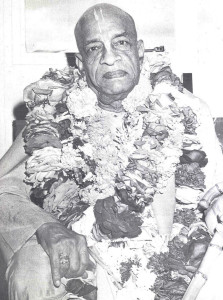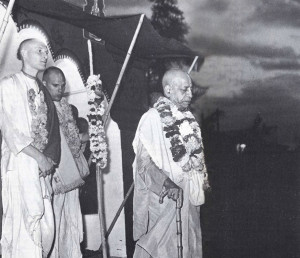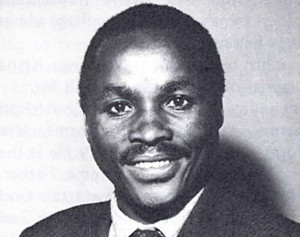An Address Given At The University Of Nairobi
His Divine Grace A.C. Bhaktivedanta Swami Prabhupada
 Ladies and gentlemen, thank you very much for kindly coming here to participate in this meeting for spreading Krsna consciousness. The Krsna consciousness movement is trying to bring human society to the point where everyone’s life can become successful. The subject today is the real meaning of human life. We are trying to instruct the entire world about this meaning.
Ladies and gentlemen, thank you very much for kindly coming here to participate in this meeting for spreading Krsna consciousness. The Krsna consciousness movement is trying to bring human society to the point where everyone’s life can become successful. The subject today is the real meaning of human life. We are trying to instruct the entire world about this meaning.
Human life is attained after many, many millions of years of evolution. We should remember that there are 8,400,000 species of life according to Padma Purana. Life began with the aquatics, for we can understand from Vedic literature that at the beginning of creation the entire planet was merged in water. This material world is composed of five gross elements—earth, water, fire, air and ether. Besides these there are three subtle elements—mind, intelligence and ego. Behind these curtains is the spirit soul, which is covered by these eight elements. This information is given in Bhagavad-gita.
Human beings are not the only living entities to have a spirit soul. We are all spirit souls—beasts, birds, reptiles, insects, trees, plants, aquatics and so on. The spirit soul is simply covered by different dresses, just as some of you are dressed in white clothes, some in green, some in red, etc. But we are not concerned with the dress; we are concerned with you as spirit soul. Thus it is said in Bhagavad-gita:
vidya-vinaya-sampanne
brahmane gavi hastini
suni caiva svapake ca
panditah sama-darsinah
“The humble sage, by virtue of true knowledge, sees with equal vision a learned and gentle brahmana, a cow, an elephant, a dog and a dog-eater (outcaste).” (Bg. 5.18)
The sage does not make any distinction on the basis of color, intelligence or species. He sees every living entity as a small particle of spirit soul. In the Srimad-Bhagavatam it is stated:
kesagra-sata-bhagasya
satamsah sadrsatmakah
jivah suksma-svarupa ‘yam
sankhyatito hi cit-kanah
 “There are innumerable particles of spiritual atoms, which are measured as one ten-thousandth of the upper portion of a hair.” Because we have no instrument to measure the dimensions of the spirit soul, the small particle of spirit soul is measured in this way. In other words, the soul is so small that it is smaller than an atom. That small particle is within you, within me, within the elephant, within gigantic animals, in all men, in the ant, the tree, everywhere. However, scientific knowledge cannot estimate the dimensions of the soul, nor can a doctor locate the soul within the body. Consequently material scientists conclude that there is no soul, but that is not a fact. There is a soul. The presence of the soul makes a difference between a living body and a dead body. As soon as the soul departs from the body, the body dies. It has no value. However great a scientist or a philosopher one may be, he must admit that as soon as the soul departs from the body, the body dies. It then has no value and has to be thrown away. We should try to understand this; the soul is valuable, not the body.
“There are innumerable particles of spiritual atoms, which are measured as one ten-thousandth of the upper portion of a hair.” Because we have no instrument to measure the dimensions of the spirit soul, the small particle of spirit soul is measured in this way. In other words, the soul is so small that it is smaller than an atom. That small particle is within you, within me, within the elephant, within gigantic animals, in all men, in the ant, the tree, everywhere. However, scientific knowledge cannot estimate the dimensions of the soul, nor can a doctor locate the soul within the body. Consequently material scientists conclude that there is no soul, but that is not a fact. There is a soul. The presence of the soul makes a difference between a living body and a dead body. As soon as the soul departs from the body, the body dies. It has no value. However great a scientist or a philosopher one may be, he must admit that as soon as the soul departs from the body, the body dies. It then has no value and has to be thrown away. We should try to understand this; the soul is valuable, not the body.
The fact that the soul is transmigrating is explained in Bhagavad-gita:
vasamsi jirnani yatha vihaya
navani grhnati naro ‘parani
tatha sarirani vihaya jirnany
anyani samyati navani dehi
“As a person puts on new garments, giving up old ones, similarly, the soul accepts new material bodies, giving up the old and useless ones.” (Bg. 2.22)
When a suit becomes old, we give it up and accept another suit; similarly the soul is changing dresses according to desire. Because the soul is part and parcel of God, it has godly qualities. God is the supreme will, the supreme power, the supreme independent one, and we, being part and parcel of Him, have all these qualities in minute quantity. We have willing, thinking, feeling and desiring. In the Vedas it is stated that God is the supreme living force amongst all living forces (cetanas cetananam). He is also supplying the necessities of all living entities.
We living entities are innumerable; there is no limit to our number. God, however, is one. He is also living as we are, but we are minute particles of that living force. For example, a particle of gold is the same in quality as a gold mine. If we chemically analyze the ingredients in a small drop of water, we will find all of the ingredients that are to be found in the vast ocean. In a similar way, we are one with God, being His part and parcel. This godly particle, the soul or the living force, is transmigrating from aquatics to trees and plants and then from trees and plants to insect life, then to reptile life, then to the bodies of birds and beasts. Darwin’s theory of evolution is but a partial explanation of the transmigration of the soul. Darwin has simply taken information from Vedic literature, but he has no conception of the soul. The difference is that the soul is transmigrating from aquatic life to plants and trees, then to insect life, then to bird life, then animal life, then human life, and within human life he moves from uncivilized life to civilized life, etc. The civilized life of a human being represents the culmination of evolution. Here is a junction: from this point we can again slide down into the cyclic process of evolution, or we can elevate ourselves to a godly life. The choice is up to us. This is indicated in Bhagavad-gita.
 This human form of life actually means developed consciousness; therefore we should not waste our lives like cats, dogs and hogs. That is the injunction. Although this body is perishable like a dog’s or cat’s body, it is different in that one can attain the highest perfection in this life. We are part and parcel of God, but somehow or other we have fallen into this material existence; now we have to evolve in such a way that we can go back home, back to Godhead. That is the highest perfection.
This human form of life actually means developed consciousness; therefore we should not waste our lives like cats, dogs and hogs. That is the injunction. Although this body is perishable like a dog’s or cat’s body, it is different in that one can attain the highest perfection in this life. We are part and parcel of God, but somehow or other we have fallen into this material existence; now we have to evolve in such a way that we can go back home, back to Godhead. That is the highest perfection.
There is actually another world, a spiritual world. As stated in Bhagavad-gita:
paras tasmat tu bhavo ‘nyo
‘vyakto ‘vyaktat sanatanah
yah sa sarvesu bhutesu
nasyatsu na vinasyati
“Yet there is another nature, which is eternal and is transcendental to this manifested and unmanifested matter. It is supreme and is never annihilated. When all in this world is annihilated, that part remains as it is.” (Bg. 8.20)
In this material nature, everything is created, it stays for some time, produces some by-products, dwindles and finally vanishes. Our bodies are created at a certain moment by sexual intercourse. The semina of the father emulsifies and takes a pea form, and the living entity, or soul, takes shelter in that form, and because it takes shelter, it develops hands, legs, eyes, etc. This development is complete in the seventh month, and in the ninth month the human being comes out of the womb. It is because the soul is present that the child develops. If the soul is not present, there is no development, and the child is born dead. We can take this dead body and preserve it in chemicals, but it will not develop. Development means change of body. All of us have had baby bodies, but those bodies are no longer existing. The body of a baby develops into the body of a child, and that body develops into the body of a boy, and that body develops into a youth’s body, which eventually turns into an old man’s body. Finally the body completely vanishes. The whole cosmic manifestation, the gigantic form of this material world, is also working according to this same process. It is created at a certain point, it develops, it is maintained, and at a certain stage it is dissolved. That is the nature of the material world. It is manifest at a certain interval, and again it vanishes (bhutva bhutva praliyate).
The word bhava means nature. There is another nature which never dissolves, which is eternal. As jivas, spirit souls, we are also eternal. This is verified in Bhagavad-gita:
na jayate mriyate va kadacin
nayam bhutva bhavita va na bhuyah
ajo nityah sasvato ‘yam purano
na hanyate hanyamane sarire
“For the soul there is neither birth nor death. Nor, having once been, does he ever cease to be. He is unborn, eternal, ever-existing, undying and primeval. He is not slain when the body is slain.” (Bg 2.20)
Just as God has no birth or death, we spirit souls can have neither birth nor death, but because we think, “I am this body,” we consider that we are born and that we die. Such thinking is called maya, or illusion, and as soon as we get out of this illusion of identifying the soul with the body, we attain the stage called brahma-bhuta. When one realizes aham brahmasmi, “I am not this body; I am spirit soul, part and parcel of the Supreme Brahman,” he attains what is called Brahman realization. As soon as Brahman realization is attained, one becomes happy.
Is this not a fact? If you understand clearly that you have no birth and death, that you are eternal, will you not become happy? Yes, certainly. Thus when one is Brahman realized, spiritually realized, he has no more to do with hankering or lamentation. The whole world is simply hankering and lamenting. You African people are now hankering to be like Europeans and Americans, but the Europeans have lost their empire, and now they are lamenting. So in this way one party is hankering and another is lamenting.
Similarly, this material life is simply a combination of hankering and lamenting. We are hankering for those things which we do not possess, and we are lamenting for those things which we have lost. That is our material business. If we realize, however, that we are part and parcel of the Supreme Personality of Godhead (Param Brahman) and that we are Brahman, then we will transcend this hankering and lamenting.
The so-called universal brotherhood or unity that the United Nations is trying to achieve is only possible when you come to the spiritual platform, or Brahman realization. Brahman realization is the aim of human life. One should not work like cats, dogs and hogs. The hog is always very busy day and night trying to find stool, and when he finds it, he eats it and becomes sexually agitated and has sex without discrimination. A hog will have sex with his mother or sister or anyone else, and this is a hog’s life. However, the scriptures indicate that the human form of life is not meant for working hard for sense gratification like cats, dogs and hogs. It is meant for realizing, “I do not belong to this material world. I am spirit soul and am eternal, but somehow or other I have fallen into this conditional life of birth, old age, disease and death.” This human form of life is meant for making a solutton to these four material miseries—birth, old age, disease and death. That is the aim of human life. Just try to understand that human life is not meant for working very hard like hogs and then having some sense gratification and then all of a sudden dying.
People who do not believe in the soul are in a most unfortunate condition. They do not know where they came from nor where they are going. Knowledge of the soul is the most important knowledge, but it is not discussed in any university. But what is the constitution of this body? What is the distinction between a dead body and a living body? Why is the body living? What is the condition of the body, and what is its value? No one is presently studying these questions, but by this Krsna consciousness movement we are trying to educate people so that they can understand that they are not these bodies but are spirit souls. The business of human life is different from the business of cats and dogs. That is our message.
As far as the soul is concerned, the evolutionary process is going on, and we are struggling for existence, struggling to come to the point of eternal life. That eternal life is possible. If you try your best in this human form of life, in your next life you can get a spiritual body. Your spiritual body is already within you, and it will develop as soon as you become free from the contamination of this material existence. That is the aim of human life. People do not know what actual self-interest is; it is to realize oneself, to realize, “I am part and parcel of God, and I have to return to the kingdom of God to join with God.”
Just as we have a social life here, God has a social life in the spiritual kingdom. You can join Him there. It is not that after finishing this body you become void. No. That is a wrong conception. In Bhagavad-gita, Krsna told Arjuna on the Battlefield of Kuruksetra:
na tv evaham jatu nasam
na tvam neme janadhipah
na caiva na bhavisyamah
sarve vayam atah param
“Never was there a time when I did not exist, nor you, nor all these kings; nor in the future shall any of us cease to be.” (Bg. 2.12)
The process for attaining eternal life is very easy, and yet at the same time very difficult. It is difficult because people in the beginning do not believe in the existence of transmigration of the soul. However, if we simply take knowledge from the authorities, the process becomes very simple. Our process of Krsna consciousness is to take knowledge from Krsna, the most perfect being, and not from an ordinary being conditioned by the laws of material nature. Knowledge taken from a conditioned being is sure to be defective.
 What are the defects of the conditioned soul? He is sure to commit mistakes, sure to be illusioned, sure to cheat others, and sure to have imperfect senses. We cannot attain knowledge perfectly because we want to cheat others and our senses are imperfect. Although our senses are imperfect, we are very proud of our eyes and we want to see everything. Therefore someone says, “Can you show me God ?” Actually the answer is yes. Why can’t you see God at every moment? Krsna says, raso ‘ham apsu kaunteya: “I am the taste of water.” Everyone drinks water, and the taste is there—so if we think of this taste as God, we begin the process of God realization. Krsna also says, prabhasmi sasi-suryayoh: “I am the sunshine, and I am the moonshine.” We all see the sunshine and moonshine every day, and if we think of how it is the sun and moon are emanating light, we will ultimately reach God. There are so many similar instances. If you want to be God conscious and realize God yourself, it is not very difficult. You have simply to follow the prescribed methods. As stated in Bhagavad-gita: tato mam tattvato jnatva (Bg. 18.55). We must simply try to understand God in truth and try to understand His appearance, disappearance and functions. When we understand Him in truth, we immediately enter the kingdom of God. After quitting this body, the person who understands God, or Krsna, does not come back again to accept another material body. Krsna says, mam eti: “He comes to Me.” That is our aim.
What are the defects of the conditioned soul? He is sure to commit mistakes, sure to be illusioned, sure to cheat others, and sure to have imperfect senses. We cannot attain knowledge perfectly because we want to cheat others and our senses are imperfect. Although our senses are imperfect, we are very proud of our eyes and we want to see everything. Therefore someone says, “Can you show me God ?” Actually the answer is yes. Why can’t you see God at every moment? Krsna says, raso ‘ham apsu kaunteya: “I am the taste of water.” Everyone drinks water, and the taste is there—so if we think of this taste as God, we begin the process of God realization. Krsna also says, prabhasmi sasi-suryayoh: “I am the sunshine, and I am the moonshine.” We all see the sunshine and moonshine every day, and if we think of how it is the sun and moon are emanating light, we will ultimately reach God. There are so many similar instances. If you want to be God conscious and realize God yourself, it is not very difficult. You have simply to follow the prescribed methods. As stated in Bhagavad-gita: tato mam tattvato jnatva (Bg. 18.55). We must simply try to understand God in truth and try to understand His appearance, disappearance and functions. When we understand Him in truth, we immediately enter the kingdom of God. After quitting this body, the person who understands God, or Krsna, does not come back again to accept another material body. Krsna says, mam eti: “He comes to Me.” That is our aim.
Therefore we should not waste our time living like cats and dogs. We should live comfortably, but at the same time we should be Krsna conscious, or God conscious. That will help us become happy. Without understanding God and without becoming God conscious, there is no possibility of peace and happiness. The way of peace and happiness is outlined in Bhagavad-gita.
If you really want to understand God, He is very easy to understand. God is the proprietor of everything. Isavasyam idam sarvam. Unfortunately we are thinking, “I am the proprietor.” In your country, for instance, the British have sometimes claimed to be proprietors, and now you are claiming to be the proprietors—so who knows what will happen in the future? Actually no one knows who the real proprietor is. The land is there, and it is the property of God, but we are simply thinking, “I am this proprietor. I own this, and I own that.” Actually America existed before the Europeans came, but now the Americans are thinking, “We are the proprietors.” Similarly, before them the red Indians were thinking, “We are the proprietors.” The fact is that no man is an actual proprietor; the proprietor is God.
isavasyam idam sarvam
yat kinca jagatyam jagat
tena tyaktena bhunjitha
ma grdhah kasya svid dhanam
“Everything animate or inanimate that is within the universe is controlled and owned by the Lord. One should therefore accept only those things necessary for himself, which are set aside as his quota, and one should not accept other things, knowing well to whom they belong.” (Iso. 1)
This realization is wanting. Krsna claims proprietorship over all forms—including American forms, African forms, cat forms, dog forms, tree forms, etc.—for in actuality He is the proprietor and the Supreme Father. If we simply realize this, we attain God realization. Actually if we realize God as prescribed in the authorized books and Vedic literatures, we will find that there will no longer be quarrels between this party and that party Everything will be peaceful.
Everyone has the right to use God’s property, just as a son has the right to live at the cost of his father. It is even stated in the scriptures that even a small animal in the home must be given some food. That is spiritual communism. No one should remain hungry, not even a serpent. We are always afraid of serpents, but if we find a serpent to be living in our house, it is our duty to see that the serpent is also fed. This is the conception of God consciousness, or Krsna consciousness: samah sarvesu bhutesu (Bg. 18.54). One who is transcendentally realized is equally disposed to every living entity. Thus Bhagavad-gita points out that when one sees everyone equally, as part and parcel of the Supreme Lord, one actually begins his devotional life. This Krsna consciousness movement is trying in an authoritative way to make everyone understand what he is and what the aim of life is. This process of purification of the heart is very easily accomplished. One simply has to chant this mahamantra—Hare Krsna, Hare Krsna, Krsna Krsna, Hare Hare/ Hare Rama, Hare Rama, Rama Rama, Hare Hare. It can actually be seen that in this movement there are boys and girls from different countries and different religions, but no one is concerned with any particular section, country or religious body. We are simply concerned about knowing our selves and our relationship with God.
God is the supreme proprietor, and we are all His sons or servitors. Therefore let us engage ourselves in the service of the Lord, as recommended in Bhagavad-gita. As soon as we understand that God is the proprietor of everything, then all the troubles of the world will immediately be solved. This may take some time. It is not expected that everyone will understand this high philosophy, but if the intelligent people in every country try to understand it, that will be sufficient. In Bhagavad-gita it is stated:
yad yad acarati sresthas
tat tad evetaro janah
sa yat pramanam kurute
lokas tad anavartate
“Whatever action is performed by a great man, common men follow in his footsteps. And whatever standards he sets by exemplary acts, all the world pursues.” (Bg. 3.21)
We therefore invite the most intelligent men in the world to understand this Krsna conscious philosophy and try to distribute it all over the world. We have now come to these African countries, and I invite all intelligent Africans to come and understand this philosophy and distribute it. You are trying to develop yourselves, so please develop spiritually, for spiritual development is sound development. Don’t imitate the Americans and Europeans who are living like cats and dogs. Such civilizations built on the consciousness of sense gratification cannot stand. The atomic bomb is already there, and as soon as the next war breaks out, all their skyscrapers and everything else will be finished. Try to understand this from the real viewpoint of human life, the spiritual viewpoint. This is what this Krsna consciousness movement is about. We therefore request you to try to understand this philosophy. Thank you very much.
 In January ISKCON staged the World Hare Krsna Movement Festival at Nairobi City Stadium. His Divine Grace A.C. Bhaktivedanta Swami Prabhupada, the founder-acarya of ISKCON, presided over five days of kirtanas, lectures, cinema shows, prasadam feasting and initiation ceremonies. The festival was highlighted one evening by a speech read by Mr. Y. Komora, Kenya’s Director of Education, for Hon. Taita Arap Towett, the Minister of Education. This is the text of that speech.
In January ISKCON staged the World Hare Krsna Movement Festival at Nairobi City Stadium. His Divine Grace A.C. Bhaktivedanta Swami Prabhupada, the founder-acarya of ISKCON, presided over five days of kirtanas, lectures, cinema shows, prasadam feasting and initiation ceremonies. The festival was highlighted one evening by a speech read by Mr. Y. Komora, Kenya’s Director of Education, for Hon. Taita Arap Towett, the Minister of Education. This is the text of that speech.
Honorable President, Ladies and Gentlemen, I am pleased to be with you today as you celebrate the World Hare Krsna Movement Festival here at the City Stadium, and I wish to thank the President of the International Society for Krishna Consciousness, Kenya Branch, Mr. Brahmananda Svami, for inviting me to be with you here today.
Kenya, as you know, is a country which welcomes visitors. Our Constitution guarantees to every religion complete freedom of worship and preaching insofar as this is compatible with public order.
The people of Kenya enjoy complete freedom to practice the faith of their choice and are willing to listen intelligently to anyone who has something to say on this subject. In the traditional African way of life, religion played an essential part. In modern Kenya too religion still plays a big part in the lives of our people.
I am informed that the International Society for Krishna Consciousness was formed in 1966. The founder was His Divine Grace A.C. Bhaktivedanta Swami who is still your respected leader and teacher. I understand that although the movement for Krsna consciousness is relatively young, it is based on a philosophy which goes back very far—5,000 years, in fact. I am referring to the ancient text known as the Bhagavad-gita. This famous text, it seems, is the “Bible” of your movement. Your learned founder has made this great book available to readers in an English translation with an erudite commentary.
Your revered founder, A.C. Bhaktivedanta Swami, has written, “Bhagavad-gita is the philosophy of Krsna consciousness. It teaches what is your relationship with God, what is your eternal duty to God, and what is the ultimate end of life.” Many people today, as always throughout the ages, are asking the question, “What is the ultimate end of life?” Your movement offers one answer to this question, based on the ancient Vedic scriptures. In the modern world the same answer does not satisfy everybody. People are searching, and they go on searching until they find an answer which satisfies them.
There are many religions and philosophies to choose from. Here in Kenya, our people are free to choose the religion or the philosophy which they find most satisfying.
Whatever religion our “wananchi” [citizens] adopt, our Government insists that they show tolerance and respect for others. No matter how strongly a person believes and no matter how convinced he may be that he has found the right answer, he must remember that others believe just as strongly and are just as convinced that they also have the right answer, which is not the same as his. Everyone must learn not to despise someone who believes differently from himself. Indeed he must always respect the belief of other people.
Your movement, like all the great religions of mankind, teaches that all men are brothers because we have one Father, who is God. If this basic teaching is followed, then religion can be a strong unifying influence. As Minister for Education, I can say that this is the attitude which we wish to teach our young people. They should all regard each other as brothers. In this way we are building a strong and united Kenya. On the other hand, we are opposed to anyone who tries to sow discord and division among our people. The motto of our country, given to us by our beloved President, Mzee Jomo Kenyatta, is “Harambee,” which means “Let us all work together for the good of all.” Hence, we welcome anyone who is willing to work with us in the spirit of Harambee.
I shall conclude by wishing you all a happy Festival and realization of all your ideals.

Leave a Reply